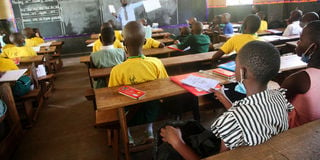New curriculum grading system confuses parents

Pupils pictured attending class recently. PHOTO/ FILE
What you need to know:
- Before the new curriculum was rolled out, the performance of learners was presented in percentage scores of between 0 and 100 per cent. This has since changed for the Lower Secondary Curriculum, which is currently competence-based
Confusion continues to mar the new curriculum, with parents saying they are finding it difficult to understand how their children in Senior One and Senior Two performed in the recently concluded term one.
Before the new curriculum was rolled out, the performance of learners was presented in percentage scores of between 0 and 100 per cent. This has since changed for the Lower Secondary Curriculum, which is currently competence-based. Learners are graded on the competence exhibited in the subjects they are offering.
Report cards for Senior One and Senior Two, which Monitor has seen, do not categorise students based on their class positions, something that has left many parents confused.
“I don’t know if my son passed or not. I have failed to understand the report, what I understood is the teachers’ comments which range from good to achieved, and fair, among others,” a parent, who preferred anonymity, said.
Mr Wilson Waako Kirungi, a high school teacher, said: “This report is really different, my child is a student at Naalya SS; this report has very many activities of integration. When I received the report, I actually did not understand, I had to consult from the dean of studies at my school to understand the current grading.”
New system
Under the new curriculum, teachers grade students on a scale of 3, that is, 1, 2 and 3. All marks are out of a cumulative mark of 20 per cent whose average at the end of Senior Four will be sent to Uneb as continuous assessment.
The national exams body will then add the 20 percent onto the 80 percent it will use for assessment in the final exams to make the total of 100 percent.
“On the report, they will show you the scale of three, it means a child is outstanding; 2 is moderate, which means fairly good, the child has acquired most of the skills but has not excelled as the one who has 3, between 1 and 2, that is basic, the child has demonstrated basic performance,” said Mr Swaib Musubire, a teacher in Wakiso District.
Mr Musibire also explained the units that are presented on the various report cards that make up the average score.
READ: 164 schools miss textbooks for lower secondary curriculum
Mr Brian Mugisa, the deputy head teacher-in-charge of academics at Rubona SS in Bunyangabu, added that all activities of integration are marked under the lowest denominator of 10. “The questions we set have competencies, when you set a question, there are certain things you want a child to bring out. If it’s one competence, it’s marked out of 10, if there are two it’s out of 19, if there are three it’s out of 28, for four it’s out of 37; like that,” said Mr Mugisa.
He added: “…if a student gets 7 out of 10, initially that would be 70 percent but since now we are scaling them up to 3, we shall divide 7 by 10 and multiply by 3, meaning the learner will get a score of 2.1.”
However, there are some schools who have not yet implemented the new grading system and have issued ordinary report cards.
Mr Martin Okiria, the chairperson of the Head Teachers Association, said they were not prepared and will soon comply. “With the ongoing training by the National Curriculum Development Centre (NCDC), everybody should be able to come on board. They are now training four teachers from each school who should be able to teach the others,” said Mr Okiria.
The Ministry of Education spokesperson, Dr Dennis Mugimba, said there are plans to carry out public awareness about the new grading system.
“We are planning on having an open engagement through the media where we shall be creating broader general awareness on how this assessment is done ,” he said.




